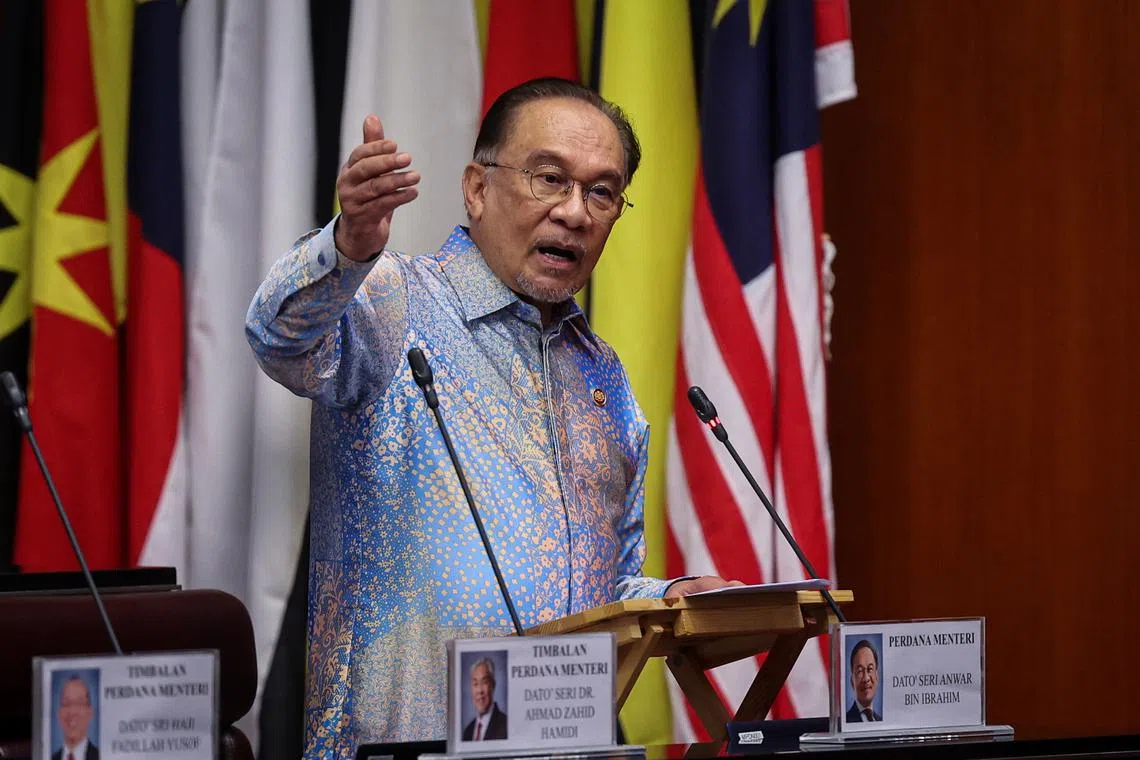News analysis
Despite midterm rating uptick, Malaysian PM Anwar faces fiscal challenges, political pressures
Sign up now: Get insights on the biggest stories in Malaysia

Malaysian PM Anwar Ibrahim faces a host of tough issues, even as current political stability has resulted in an uptick in support for the premier.
PHOTO: BERNAMA
KUALA LUMPUR - Prime Minister Anwar Ibrahim has crossed the halfway mark of his first term as Malaysia’s top leader, and amid marginal gains in approval ratings, he is still up against a minefield of political and economic challenges.
From the looks of it, the Anwar administration’s sputtering attempts to implement tax hikes and subsidy cuts perhaps encapsulate the hesitation to put its foot down on steps deemed necessary for long-term fiscal health, as well as moves that could be seen as not only detrimental to those at the bottom of the economic ladder but also politically risky.
Though Malaysia’s inflation is at its lowest level in over four years, the cost of living is widely seen as continuing to climb – with the expanded sales and service tax (SST) taking effect from July 1
The government is also considering whether to stop commercial eateries from using subsidised cooking gas, a scheme that would jack up the cost of eating out.
Though some of the measures have yet to be implemented, these issues have added to widespread views that prices of goods and services are all heading north.
“We used to eat out almost every day, but now we have cut it down to just two meals outside on weekends,” said teacher S. Lee, 43. Her family of four used to spend around RM80 (S$24) for a meal at a casual cafe, but now that same meal could easily cost RM120, especially for Western dishes like pasta.
“Even economy rice isn’t economical any more,” she said, noting that it is getting harder to keep a simple rice-and-dishes combo to under RM12 for each person.
The worries come as Datuk Seri Anwar, 77, faces a host of tough issues while crossing the halfway mark of his first five-year term that began in November 2022
His term as Malaysia’s 10th prime minister has been lauded for bringing back political stability, compared with the chaotic years that saw a succession of three prime ministers in the aftermath of the 2018 general election until Mr Anwar took the country’s top post in 2022.
His ascent to the country’s highest office back then was accompanied by a surge of expectations of his reformist government. Some 2½ years later, however, his administration has lost some of its shine.
Of late, there have been ringing concerns ranging from the ever-rising cost of living, to the crimping of democracy under his rule, including public anger over the use of government agencies to investigate and charge online critics. This comes amid growing unease in recent weeks over the government’s mobile phone data project which collects users’ mobile data from telcos without an opt-out option, raising concerns over free speech.
Social media censorship in Malaysia also surged during Mr Anwar’s first year in power
Nevertheless, a poll by independent pollster Merdeka Center released on June 23 showed Mr Anwar’s approval rating rising slightly to 55 per cent in May, up from 54 per cent in December 2024, and 50 per cent in November 2023.
The pollster credited this to several factors, including a sense among Malaysians that the country is more stable politically, with Mr Anwar’s leadership backed by a two-thirds parliamentary majority.
The Merdeka Center’s May survey of 1,208 voters, drawn from all major ethnic groups via stratified sampling, also found that the Prime Minister’s global profile has improved, citing his hosting of Chinese President Xi Jinping in April
It also noted that cost-of-living relief measures such as an RM1,700 minimum wage, festive cash aid for civil servants and ongoing fuel subsidies under Mr Anwar have helped ease public frustration.
However, analysts caution against over-interpreting the modest uptick.
“These are, frankly, quite marginal fluctuations which may or may not translate into voter preference come election time,” said political analyst Oh Ei Sun, a senior fellow at the Singapore Institute of International Affairs.
Despite the improved ratings that offer a sliver of optimism, underlying discontent simmers – which could lead to delays or backpedalling on stated reforms.
Many Malaysians remain burdened by rising costs and looming subsidy cuts, matters which Mr Anwar must address with urgency, analysts say, as parties begin gearing up for the next general election due by February 2028.
To be sure, the Anwar administration has made some headway: Inflation in May was at a four-year low of 1.2 per cent; unemployment had eased to 3 per cent in April, the lowest in a decade; and foreign investment inflow rose 33 per cent to 2024 from the previous year.
However, these macro wins have not translated into widespread public satisfaction.
“Despite the often glorified macroeconomic numbers, many persons on the street as well as SMEs (small and medium-sized enterprises) are feeling an acute pinch,” said Dr Oh, noting that the price of his favourite chicken salad has jumped from RM28 to RM40 in the past few months.
An ongoing “rightsizing” exercise at state oil giant Petronas
With the company struggling to maintain its RM32 billion annual dividend to the federal government amid a sharp decline in profits in 2025, this is just one of the pressure points Mr Anwar’s government faces in sustaining revenue while pushing ahead with fiscal reforms.
Meanwhile, a plan to cut subsidies for the widely used RON95 petrol
A revision of the SST from July 1, initially set to raise costs on a wide range of goods and services including imported fruit, beauty treatments as well as elderly care and banking, sparked public furore. In response, the Finance Ministry announced a U-turn on June 27, exempting several items such as imported apples, oranges, mandarins, dates and beauty services from the list.
Mr Amir Fareed Rahim, strategic director at risk consultancy KRA Group, said: “The economic reforms it (the government) has mooted, including subsidy rationalisation, are needed but politically risky.”
He added: “There is increased restlessness on the ground with insecurities over increased cost of living and wider global economic uncertainties squeezing Anwar’s voter base, especially the urban middle class and vulnerable groups. The key is adroit communication and finding ways to shield both the working and middle classes.”
Mr Anwar’s unity government also faces headwinds from within. His own Parti Keadilan Rakyat (PKR) is showing signs of internal strain following former deputy president Rafizi Ramli’s failure to retain his post in party elections, which resulted in his subsequent resignation as economy minister, alongside Natural Resources and Environmental Sustainability Minister Nik Nazmi Nik Ahmad, who is a Rafizi ally. The twin exits from Cabinet
The re-emergence of a sexual assault case involving former aide Yusoff Rawther
Dr Oh said: “These are, of course, unneeded distractions.”
For now, Mr Anwar’s biggest advantage is the lack of a credible alternative.
KRA Group’s Mr Amir noted: “Voters still put a premium on political stability. The administration has undoubtedly provided that, along with its nascent moves towards reform.”
The opposition remains fragmented, with Perikatan Nasional’s key Parti Islam SeMalaysia and Parti Pribumi Bersatu Malaysia preoccupied with leadership tussles.
Hurdles remain though, and Mr Anwar needs dexterity to juggle governance, reforms and political survival, said analysts. He must push forward with institutional changes and better communication on economic policies, while retaining support of the multi-ethnic electorate.
KRA Group’s Mr Amir said: “PKR is fundamentally a big-tent party. It cannot afford to give up on many demographics.”
Mr Anwar became prime minister – after a hung Parliament in the 2022 general election
He rose to power after forming a multi-coalition unity government with support from his Pakatan Harapan, former foe Barisan Nasional, and Borneo coalitions, securing a two-thirds majority in Parliament.
Winning broader Malay support remains a major political challenge for him ahead of the next general election.
As Malaysia braces itself for more economic headwinds and shifting geopolitical tides, the Prime Minister’s ability to keep the country on an even keel, while managing political landmines, will determine whether his unity government survives the next polls.
“Also, he needs to keep his base on side with sensible and substantive governance reforms, and to make stronger inroads into the Malay votes, especially the fence sitters and the vulnerable lower middle-class groups,” said KRA Group’s Mr Amir.
Support from Sabah and Sarawak remains vital, as calls for greater Borneo federalism grow louder, with leaders pushing for more autonomy and fairer resource-sharing under the Malaysia Agreement 1963.
“It’s a delicate balancing act but if he (Anwar) can do it – a second term is certainly within reach,” said KRA Group’s Mr Amir.
Hazlin Hassan is Malaysia correspondent at The Straits Times.



